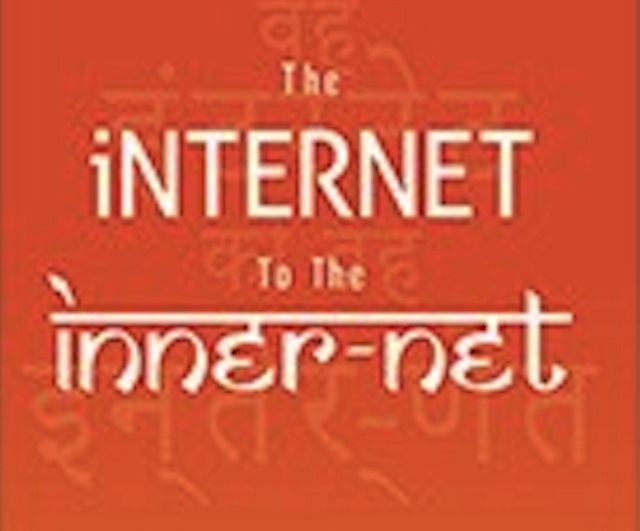
Within You, Without You
Gopi Kallayil’s first book, The Internet to the Inner-Net, is a prescription for a way of life that embraces the conflicting pulls of work and personal needs in a hyper-connected world, and provides hope early on.
The Internet to the Inner-Net: Five Ways to Reset Your Connection and Live a Conscious Lifeby Gopi Kallayil, Hay House
Right on the cover, the catchy title of Gopi Kallayil’s book The Internet to the Inner-net grabs the reader’s attention and provides a glimpse of what lies within. A world that tries to bridge a high-tech, always on, information over-loaded modern life to a more spiritual, timeless, mindful and reflective inner life. The author, a senior Google executive and (full disclosure) a friend for nearly thirty years, leads us through his deliberate efforts to lead a life that embraces the trappings of modern technology – exactly what we would expect from a Google executive – while keeping it at enough of a distance that his spiritual self gets the space it needs to flourish and grow.
I heard the author give a talk on this subject for the first time in December 2013, at an IIM reunion in Kolkata, and then again in Singapore, a year later. A masterful public speaker, he gave a hugely entertaining talk, well-practiced and presented in a self-deprecating and self-effacing manner that belies a sharp mind, an acerbic wit, and a compassionate soul that has always defined him as a human being in all the years I have known him. And the one thought that kept coming back to me was: shouldn’t this be a book? And, nearly 2 years later after my first hearing, here it is.
Part self-help, part travelogue, part personal diary, the book is a prescription for a way of life that embraces the conflicting pulls of work and personal needs, and provides hope early on. We don’t have to compromise. We can embrace it all, “Be the Bison”, and walk towards it, make peace with it, thrive on it.
The author speaks from a rich set of experiences that take him from his beginnings in a family of limited means in rural Kerala in India, to the shiniest of magnetic objects that draws the best and brightest across the world – Silicon Valley, where he lives today. In the intervening years, he travels across 7 continents and 54 countries, and keenly observes fellow human beings and other cultures. From his position at Google, he comes in touch with some of the most revered spiritual leaders, including the Dalai Lama, and talks about the power of faith, the fearlessness needed to pursue the impossible, and the courage to confront one’s own weaknesses and failings.
The book is full of practical advice, from how to manage email overload, to mindful eating, the importance of a good night’s sleep, and time management. He brings us into his world with lucid and candid examples of his own successes and shortcomings with the many techniques he has experimented with to lead a balanced life, enjoy every moment of it, and be grateful for it.
The chapter where he talks about building the Yogler movement at Google, a worldwide community of Yoga practitioners he started from nothing, is an inspiring example of personal conviction and leadership principles, as is the enormous task of connecting global leaders for a one-of-a-kind Google Hangout to pay tribute to the late Nelson Mandela, featuring Archbishop Desmond Tutu and The Dalai Lama participating from locations halfway across the world from each other.
The book is an easy read, and even if the author draws on references from Lao Tzu to Gandhi to Santayana, the reader can just keep reading on without having to pause for clarity. The prose is simple, and the touch is personal, as if he is talking directly to you – his friend, his younger brother, his god-daughter.
The book is very timely. We live in a world where technology is making us more productive and inter-connected than we could ever have imagined, but also where state paternalism and rogue cyber-attacks that target our privacy and security are the biggest threats to our lives. A world where we proudly publish our professional accomplishments on Linked In, but crave the “likes” of our fellow humans on Facebook , and use Whatsapp groups as a clearing house for internet garbage, passing it on as easily and effortlessly as ebola. If anything, the book’s core message is – chill. Just a bit.
The book succumbs to the temptation to list everything out – 5 ways to do this, 11 ways to achieve that, outsource everything else – that can make the reader feel that life can be reduced to a formula, or perhaps even a simple Google search algorithm for happiness. While building a case for practical vegetarianism, the author sidesteps the ethical foundations on which most vegetarians choose plant-based food, and the conflicting research around the actual carbon footprint of our food sources. Some of the author’s personal practices, such as scheduling appointments with himself, and scheduling all but 20 % of his time for what seems like a fairly disciplined – some may say regimented – way of life, may appear inauthentic to those who accept serendipity and feel no need for structure of any kind. Indeed, the sadhus he fondly remembers meeting at Kumbh Mela live just such a life, and are none the worse for it, even though they carry their smartphones as well.
Paddy Padmanabhan is based in Chicago and writes about culture, among other things. He is a huge fan of mob movies.